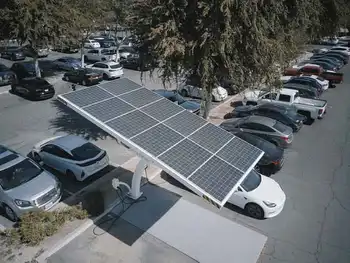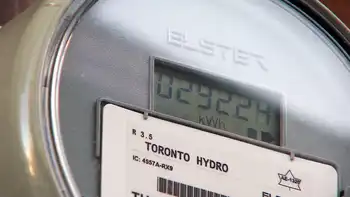Will electric cars survive?
By 24 Hours Vancouver
CSA Z463 Electrical Maintenance -
Our customized live online or in‑person group training can be delivered to your staff at your location.

- Live Online
- 6 hours Instructor-led
- Group Training Available
He hasn't needed to.
His commuter vehicle would look like any of the other popular Toyota crossovers on the road, if it weren't for the bright "electric vehicle" decals stuck to it.
"It's quite an attention grabber," Leifso admits. "People ask questions like, 'Did you build it? Where can I get one?'"
Leifso's 2003 model was among the last of the plug-in electric vehicles Toyota retailed in California before shutting down its line.
It's proven its worth to Leifso already.
Although acceleration is noticeably sluggish, the car can zip down the highway at 130 km/h.
And with a range of about 160 km, it costs about $2 to "fill up" when he charges up the RAV4 at home through a paddle that slips in under the front grill.
That's about one-fifth of the cost of filling up a regular gas-powered RAV4, Leifso says.
And as gas prices head north of $1 per litre and car companies continue their public struggle to survive, the interest in alternative fuel technologies is only spiking.
Today, most major manufacturers have rushed to promise electric vehicles for the market within years. Canadian auto-parts magnate Frank Stronach wants to mass-produce electric cars within three years.
But what are the chances of the technology succeeding? Is the idea that electric vehicles will be widespread in just a few years merely a pipe dream?
"It's never been more serious," says auto industry analyst Dennis DesRosiers, of manufacturers' renewed interest in electric vehicles. "They're investing billions into developing the technology."
But still, DesRosiers doesn't believe there will be wide acceptance of the technology any time soon.
"Electric vehicles' ability to get into the mainstream is probably at least a decade, if not two decades, out into the future," he says. "It's just that daunting a technological challenge."
He points to the popularity of hybrid vehicles, which have been readily available for several years now.
Out of 1.6 million new vehicles sold in Canada last year, he says, only 25,000 were hybrids.
There are significant barriers to widespread acceptance as well as a wide range of other alternative technologies from biodiesel and ethanol to solar and hydrogen power.
"Promoters of electric vehicles tend to isolate themselves, that they are the only competing technology to gas. There are actually 10 or 12 different technologies."
Some manufacturers, too, are casting a wide net.
"We have not backed any particular solution," says Honda Canada executive vice-president Jerry Chenkin, who calls his company's strategy a "portfolio approach."
"We are recognizing the fact that nobody knows which solution will be the best in the end. The key for us is to invest in several different alternative solutions."
Proponents of electrical vehicles, however, see the technology only growing.
"It is where cell phones were in 1985," says John Stonier, of the Vancouver Electric Vehicle Association.
"The cell phone in 1985 was a brick. It had a huge battery and there was very little production. The electric car industry is at the exact same point."
Even with today's technology, Stonier argues, electric vehicles would be fine for most consumers, getting them from point A to B and back in time for a charge-up.
"People's needs are actually a lot less than they think. If you look at the statistics, only one per cent of trips made with a car are above 100 miles long."
Government policy has to keep up with investments to stimulate the industry, as well as supports for the infrastructure needed to support electric vehicles, Stonier says.
Behind the scenes, steps are being taken to streamline market acceptance for EVs. Developer Concord Pacific, for example, recently announced it would build a condominium project in Vancouver with a parkade equipped to handle EV charging needs.
But provincial and federal authorities are still trying to predict exactly what kind of infrastructure will be needed to handle widespread EV acceptance.
BC Hydro, for example, is part of a provincial working group studying the demands plug-in EVs may have on infrastructure.
"We've been monitoring it," says spokesperson Dag Sharman. "The amount of electricity they would use is something we simply don't know because we don't know how many electric vehicles there would be."
A federal working group is tackling similar issues. The federally coordinated Canadian Electric Vehicle Technology Roadmap, or evTRM, is composed of industry players and is set to submit its recommendations to Ottawa.
However, initial projections for electric vehicles in Canada are modest.
By 2018, the group is envisioning 500,000 highway-capable plug-in EVs on the road, a number that adds up to about 15 per cent of new vehicles sold in Canada over the next decade, the group says.
It's not an earth-shattering number, admits Mike Elwood, chair of evTRM's steering committee.
"It's enough to get the ball rolling," says Elwood, vice-president of marketing at Azure Dynamics, a player in electric drive technology for commercial vehicles.
"Even though I personally would like to see it at 100 per cent, I know that's probably not attainable."
But although he admits the figure is conservative compared to the paradigm shift many observers see as necessary for the auto industry, it's still a daunting leap from today, he says.
"We don't have time to waste. We don't have time to sit there and say, well, in 10 years, maybe things will be different," Elwood said.











